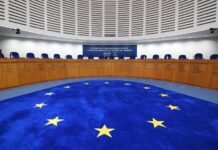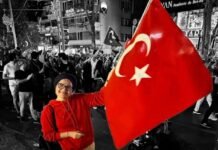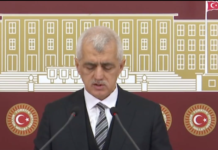Members of İstanbul’s gay and transgender community (LGBTI) gathered for a rally on Sunday instead of the annual pride march after they said the parade itself had been banned by the city’s governor for the third consecutive year.
The march used to see tens of thousands of people parade down İstanbul’s popular İstiklal Avenue, but Sunday’s rally drew a much smaller crowd, according to a report by Reuters. Just a few hundred people gathered on one of Beyoğlu’s side streets, waving rainbow flags and shouting slogans. The organizers said on Friday that the İstanbul governor had banned the gays from celebrating İstanbul’s 16th Pride March on Sunday.
“Like every year, we are here, on these streets. Our laughter, our exclamations, our slogans still echo in these streets,” organizers said in a statement read out during the rally. “We miss the marches attended by thousands where we celebrate our visibility. We make fun of those who try to place boundaries on us by the pride of our existence and the strength of our pride,” it said.
Riot police used tear gas, dogs and batons to disperse hundreds of people. The people, carrying rainbow flags and banners, had been marching down the İstiklal Avenue as part of the banned pride celebrations. Police had permitted the organizers to read just a statement before being ordered to disperse. “We do not recognize this ban,” they said, calling it “comical.”
“We do not obey, we do not shut up, we are not afraid,” many chanted. Some people affected by tear gas washed their faces while some took shelter in the buildings along the side streets of İstiklal.
İstanbul’s governor banned the march “unlawfully” for the fourth consecutive year, according to organizers. “The governor has once again committed a crime by discriminating against a specific part of society.” The march was intended to fight “violence and discrimination” against the lesbian, bisexual, transgender and intersex community (LGBTI).
“Peacefully gathering and marching are rights under domestic and international laws that the governor of İstanbul must uphold,” Amnesty International said.
İstanbul Pride took place without incident for more than a decade, however was last allowed in 2014, and banned since by the authorities. Last year the city’s governor cited concerns about the “security of citizens and tourists” and “public order” after an ultra-nationalist group threatened the march with violence.
Being gay is not crime in Turkey, unlike in many other Muslim countries, but homophobia remains widespread. Critics accuse Turkey’s political Islamist President Recep Tayyip Erdoğan and his Justice and Development Party (AKP) of showing little interest in expanding minority rights and being intolerant of dissent.
İstanbul has traditionally been seen as a relative safe haven by members of the gay community from elsewhere in the region, but although homosexuality is not a crime in Turkey, homophobia remains widespread.
Civil liberties in Turkey have become a particular concern for the West after a crackdown under a state of emergency declared following the controversial military coup attempt on July 15, 2016. Some 160,000 people have been detained and nearly the same number of state employees dismissed, the United Nations said in March.
Aside from the pride marches in İstanbul and Ankara, lesbian, gay, bisexual and transgender (LGBT) movie showings have recently been banned, with the authorities citing security reasons and public sensitivities.















